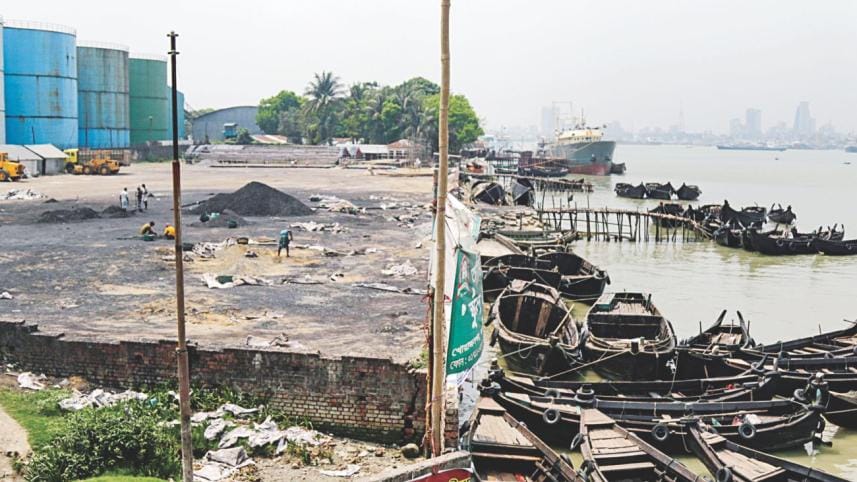Grabbing on

The Chittagong district administration, Chittagong City Corporation and Chittagong Development Authority have done nothing to reclaim the land occupied by locals on both banks of the Karnaphuli river two years after the High Court issued orders to do so.
The encroaching, coupled with sewerage and industrial pollution, has instead intensified since the issuance of the order two years ago.
The court directed the authorities concerned to evict all illegal structures from the river banks within three months.
The district administration claimed they could not begin the eviction even two years into the order as they did not get the necessary funding required to so.
A recent visit to the river revealed that new points around the water body were now being encroached as well.
The capital dredging, which Chittagong Port Authority began in July 2011 and ended in 2013, also came as an advantage for land grabbers as parts of the Karnaphuli, where the dredged earth was kept, were grabbed and then used for making houses.
The encroachment was also seen at the end point of Rajakhali, where the canal meets the Karnaphuli.
Asked, Deputy Commissioner of Chittagong Mohammed Elias Hossen told The Daily Star that there was a confusion initially regarding which kind of survey would be carried out -- RS or BS -- to base the evictions on.
“We finally received instructions to proceed with RS survey”, he said, adding that, with two thousand structures to be demolished, they need a lot of manpower and a large budget.
Elias also said they recently wrote to the land ministry requesting allocation of Tk 1.20 crore to be able to comply with the court order.
Lawyer Monjil Morshed, who filed the writ on which the HC issued the order to evict the illegal structures, told The Daily Star that the order was issued on August 2016.
“On the 25th, we sent a notice to the district administration, Chittagong City Corporation mayor, and the Chittagong development authority, stating that they did not comply with the HC order and they must do so within seven days. If they do not relocate within this timeframe, we will begin eviction.”
“In these two years, we did not find any steps taken to comply with HC order. If they still do not respond, we would resort to filing a defamation case of court against them,” he added.
Dr Mujibur Rahman Howladar, chairman of National River Protection Commission, told The Daily Star that the task of evicting illegal structures lies with the office of deputy secretary of Chittagong, Bangladesh Inland Water Transport Authority (BIWTA), and Water Development Board.
“I issued a letter asking deputy secretaries and divisional commissioners to let me know the condition of the rivers of their respective territories. We will visit Karnaphuli and Halda this month to observe their condition and will organise seminars to learn the opinions of locals,” he added.
Karnaphuli researcher and professor Idris Ali told The Daily Star that had the authorities been sincere, they could have evicted the illegal structures much earlier.
“Deputy secretary of Chittagong, Chittagong City Corporation and Chittagong Port Authority are buying time to execute the order as they are reluctant to bother the politically influential persons involved in the land-grabbing,” he added.
He opined that the government needs to take stricter action to save Karnaphuli, a river deemed as the lifeline of the country's economy.
Almost 800 factories release untreated waste into the river, he said, adding that environment department officials hardly took action against them.
The 1989-90 Hydrographic Survey Chart showed the river's width at 870 metres at Bridgeghat point, while the 2009-10 chart puts it at 600 metres.
One-third of 1,200-1,400 tonnes of solid and liquid waste from the city of six million people go to the river through 30 canals every day, as Chittagong Water Supply and Sewerage Authority is yet to set up plants for treating waste, Edris Ali added.




 For all latest news, follow The Daily Star's Google News channel.
For all latest news, follow The Daily Star's Google News channel.
Comments